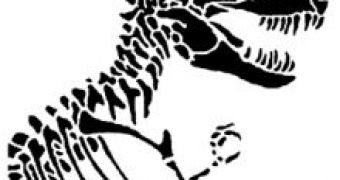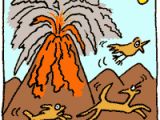A new study claiming to be the definite proof that the dinosaurs were wiped out by the asteroid impact that shook the Earth 65 million years ago has sparked new controversy. Other scientists accuse the team of "ignoring scientific methods", making claims with "no basis in fact" and "circular reasoning".
There are two main controversies: One is whether the dinosaurs were killed by an extraordinary event and the other one concerns the nature of the extraordinary event.
Some scientists claim that most dinosaurs died out simply because they didn't manage to adapt to the changing climate, which was increasingly cold. Others say that maybe their immune system didn't manage to keep pace with the development of more and more deadly microbes. In this context, more complex animals, such as mammals and birds, which were not cold blooded and thus could adapt more easily to a cold climate, and which had superior immune systems, eventually replaced dinosaurs. Being big was no longer an asset either, because as the climate got colder plants (i.e. food) got scarcer.
However, some scientists claim that the disappearance of dinosaurs was too sudden to be explained by "trivial" causes. They may agree that the climate change and maybe the dinosaur's primitive immune system may have had a contribution. But still, an extraordinary event is needed to explain such extraordinary large scale extinctions.
There are two main candidates:
Asteroid impact theory. In 1980 the American father-and-son team of Profs Luis and Walter Alvarez proposed the disaster movie scenario after studying a thin layer of sulphurous clay in Gubbio, Italy. In 1991 the Chixculub impact structure was discovered. This is a large basin more than 300 kilometers wide, centered on the Yucatan peninsula in Mexico, and it is estimated to be the outcome of an asteroid impact 65 million years ago. Could an asteroid impact have effects on global scale? According to geological findings, yes. The rock layers corresponding to the same period have a high level of iridium, which is rare on Earth, but relatively common in asteroids. Thus, it appears that the asteroid has indeed had effects on global scale. But was it responsible for the demise of the dinosaurs?
The problem is that dinosaurs didn't vanish on such a short notice - a fossil record shows they disappeared gradually over millions of years. Such a time-scale is more correlated with changes of climate and geology. Moreover, many dinosaurs as well as other species disappeared long before the actual asteroid impact.
Volcano theory As Himalayas grew, with the Indian peninsula pushing hard against the Asian Continent, intense volcanic activities took place. Over one million years three major episodes of vast volcanic activities happened. Some argue that these events provoked the climate change. More over, they were responsible for the ejection into the atmosphere of vast amounts of cadmium, nickel and selenium, which are toxic in large amounts.
Now, tensions are high on the on CCNet, a scholarly electronic network, over a paper published in the Sedimentary Geology journal by Peter Schulte of the Universit?t Erlangen-N?rnberg and colleagues, Robert Speijer, Hartmut Mai and Agnes Kontny. The authors claim having "unequivocal" evidence that debris and "ejecta" sent out by the impact coincides with the timing of the mass extinction.
Their argument is the following: There is something geologists call the K-T boundary. The rocks beneath the K-T boundary have dinosaur fossils, the ones above don't. The German scientists have analyzed the chemistry of the clay below the K-T boundary and found "no evidence that Chicxulub [impact] predated the K-P (K-T) boundary and allows for unequivocal positioning of the K-P (K-T) boundary at the event deposit".
The evidence is clear-cut. Not at all! say other scientists on CCNet. For instance Prof Gerta Keller of Princeton University even accused the team of "ignoring scientific methods", making claims with "no basis in fact" and "circular reasoning".
Angela Milner, of the Natural History Museum, London, said for the London Daily Telegraph on the issue of dinosaur's extinction: "There is absolutely no consensus as to whether there was a sole cause and what it was. The feud does not involve people who work on dinosaurs, but sedimentologists and hard rock geologists." As the London Daily Telegraph further remarked: "The only thing that everyone can agree on is that the dinosaurs became extinct."
Dinosaur Bones Poster credit: AmeriSpan Unlimited

 14 DAY TRIAL //
14 DAY TRIAL // 

